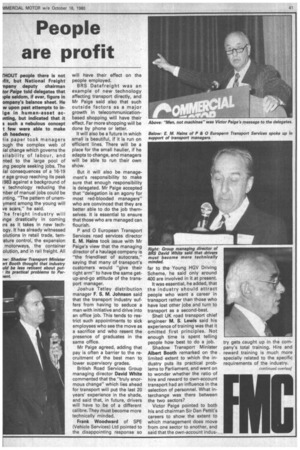People are profit
Page 43

If you've noticed an error in this article please click here to report it so we can fix it.
FHOUT people there is not fit, but National Freight rpany deputy chairman
tor Paige told delegates that )ple seldom, if ever, figure in
ompany's balance sheet. He w upon past attempts to inlge in human-asset acinting, but indicated that it s such a nebulous concept t few were able to make ch headway.
Us paper took managers augh the complex web of :ial change which governs the 3ilability of labour, and nted to the large pool of Jng people seeking jobs. The consequences of a 16-19 ir age group reaching its peak 1983 against a background of v technology reducing the Tiber of manual jobs could be inting. "The pattern of unemyment among the young will ye scars," he said.
he freight industry will Inge drastically in coming irs as it takes in new techogy. It has already witnessed olutions in retail trade, tern ature control, the expansion motorways, the container olution, and in rail freight. All will have their effect on the people employed.
BRS Datafreight was an example of new technology affecting transport directly, and Mr Paige said also that such outside factors as a major growth in telecommunicationbased shopping will have their effect. Far more shopping will be done by phone or letter.
It will also be a future in which small is beautiful, if it is run on efficient lines. There will be a place for the small haulier, if he adapts to change, and managers will be able to run their own show.
But it will also be management's responsibility to make sure that enough responsibility is delegated. Mr Paige accepted that "delegation is an agony for most red-blooded managers" who are convinced that they are better able to do the job themselves. It is essential to ensure that those who are managed can flourish.
P and 0 European Transport Services road services director E. M. Hains took issue with Mr Paige's view that the managing director of a haulage company is "the friendliest of autocrats," saying that many of transport's customers would "give their right arm" to have the same getup-and-go attitude of the transport manager.
Joshua Tetley distribution manager F. S. M. Johnson said that the transport industry suffers from having to seduce a man with initiative and drive into an office job. This tends to restrict such appointments to sick employees who see the move as a sacrifice and who resent the presence of graduates in the same office.
Mr Paige agreed, adding that pay is often a barrier to the recruitment of the best men to lower supervisory grades.
British Road Services Group managing director David White commented that the "truly enormous change" which lies ahead for transport will put the last 20 years' experience in the shade, and said that, in future, drivers will have to be of a different calibre. They must become more technically minded.
Frank Woodward of SPE (Vehicle Services) Ltd pointed to the disappointing response so far to the Young HGV Driving Scheme, he said only around 400 are involved in it at present.
It was essential, he added, that the industry should attract people who want a career in transport rather than those who have lost other jobs and turn to transport as a second-best.
Shell UK road transport chief engineer M. S. Lewis said his experience of training was that it omitted first principles. Not enough time is spent telling people how best to do a job. Shadow Transport Minister Albert Booth remarked on the limited extent to which the industry puts its practical problems to Parliament, and went on to wonder whether the ratio of hire and reward to own-account transport had an influence in the selection of personnel. What interchange was there between the two sectors?
Victor Paige pointed to both his and chairman Sir Dan Pettit's careers to show the extent to which management does move from one sector to another, and said that the own-account indus




























































































































































































































































































